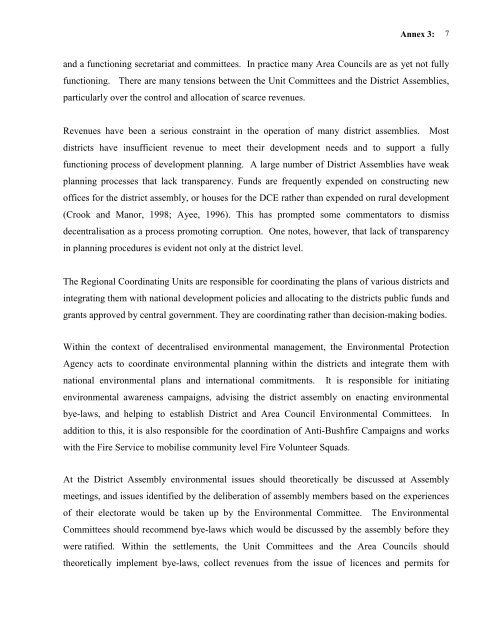Poverty Dimensions of Public Governance and Forest Management ...
Poverty Dimensions of Public Governance and Forest Management ...
Poverty Dimensions of Public Governance and Forest Management ...
Create successful ePaper yourself
Turn your PDF publications into a flip-book with our unique Google optimized e-Paper software.
Annex 3: 7<br />
<strong>and</strong> a functioning secretariat <strong>and</strong> committees. In practice many Area Councils are as yet not fully<br />
functioning. There are many tensions between the Unit Committees <strong>and</strong> the District Assemblies,<br />
particularly over the control <strong>and</strong> allocation <strong>of</strong> scarce revenues.<br />
Revenues have been a serious constraint in the operation <strong>of</strong> many district assemblies. Most<br />
districts have insufficient revenue to meet their development needs <strong>and</strong> to support a fully<br />
functioning process <strong>of</strong> development planning. A large number <strong>of</strong> District Assemblies have weak<br />
planning processes that lack transparency. Funds are frequently expended on constructing new<br />
<strong>of</strong>fices for the district assembly, or houses for the DCE rather than expended on rural development<br />
(Crook <strong>and</strong> Manor, 1998; Ayee, 1996). This has prompted some commentators to dismiss<br />
decentralisation as a process promoting corruption. One notes, however, that lack <strong>of</strong> transparency<br />
in planning procedures is evident not only at the district level.<br />
The Regional Coordinating Units are responsible for coordinating the plans <strong>of</strong> various districts <strong>and</strong><br />
integrating them with national development policies <strong>and</strong> allocating to the districts public funds <strong>and</strong><br />
grants approved by central government. They are coordinating rather than decision-making bodies.<br />
Within the context <strong>of</strong> decentralised environmental management, the Environmental Protection<br />
Agency acts to coordinate environmental planning within the districts <strong>and</strong> integrate them with<br />
national environmental plans <strong>and</strong> international commitments. It is responsible for initiating<br />
environmental awareness campaigns, advising the district assembly on enacting environmental<br />
bye-laws, <strong>and</strong> helping to establish District <strong>and</strong> Area Council Environmental Committees. In<br />
addition to this, it is also responsible for the coordination <strong>of</strong> Anti-Bushfire Campaigns <strong>and</strong> works<br />
with the Fire Service to mobilise community level Fire Volunteer Squads.<br />
At the District Assembly environmental issues should theoretically be discussed at Assembly<br />
meetings, <strong>and</strong> issues identified by the deliberation <strong>of</strong> assembly members based on the experiences<br />
<strong>of</strong> their electorate would be taken up by the Environmental Committee. The Environmental<br />
Committees should recommend bye-laws which would be discussed by the assembly before they<br />
were ratified. Within the settlements, the Unit Committees <strong>and</strong> the Area Councils should<br />
theoretically implement bye-laws, collect revenues from the issue <strong>of</strong> licences <strong>and</strong> permits for
















